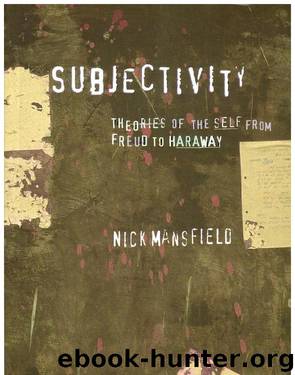Subjectivity: Theories of the Self from Freud to Haraway by Nick Mansfield

Author:Nick Mansfield
Language: eng
Format: epub
Tags: ebook, book
ISBN: 9781741150438
Publisher: ALLEN & UNWIN
Published: 2010-05-29T16:00:00+00:00
8 Radical sexuality: From perverse to queer
WE HAVE ALREADY seen how gender and sexuality have been identified by modern and postmodern theorists as key determinants of subjectivity. Psychoanalysis has seen itself as overcoming silence and superstition in the scientific revelation of the true importance of the family and sexuality in the constitution of personality. On the other hand, Foucault and others have been critical of the prestige that has accrued to power/knowledge’s inflexible categories of gender (you are either a man or a woman) and sexuality (you are either heterosexual or homosexual). To the former, the truth will allow us to recognise without shame the meaning of our desire. To the latter, any model of truth will re-imprison us in another tyrannical disciplinary order. Is late twentieth-century sexuality freedom or imprisonment, then; the end of a cruel dictatorship of morals and mores, or its most sophisticated version? The two strands of subjective theory we have been tracing—the psychoanalytic/subjective and the Foucauldian/anti-subjective—do not merely correspond to the two sides of this debate; they are more or less defined by the positions they take up in relation to it.
The first point to be made here is that sexuality, with which we will be concerned in this chapter, has been increasingly seen not just (or often not even) as a human attribute or impulse, but as a régime. Even Freud located the construction of subjectivity within the tightly knit power inequities of the bourgeois family, allowing each position in the Oedipal triangle to be read as a specific coordination of gender and power. In turn, even the genitals of both men and women attained a more than symbolic political meaning. The development of gay and lesbian, and latterly queer, theories of culture has only intensified the understanding of 105 sexuality as a political issue, involving hierarchies, oppressions, institutional mobilisation (police, doctors, courts) and all sorts of violence, from petty abuse and humiliation to physical attack and murder.
As many theorists have noted, this sexual politics is not unconnected with other political formations: political parties often adopt a wholly predictable attitude towards sexual issues, consistent with their line on economics and community relations, and a focus on the issue of sexuality inevitably draws theory into the intricate entanglement of race, gender, class and other politics. Eve Kosofsky Sedgwick wrote in Between Men, one of the most influential founding texts of queer theory:
Our own society is brutally homophobic; and the homophobia directed against both males and females is not arbitrary or gratuitous, but tightly knit into the texture of family, gender, age, class, and race relations. Our society could not cease to be homophobic and have its economic and political structures remain unchanged. (Sedgwick 1985, pp.3–4)
Sexual identities and practices, therefore, operate at a uniquely sensitive pressure point in modern and postmodern culture. Much of the coordinated analysis of sexual and other politics remains to be done, yet it does help justify the application of the word radical to the most significant theorising of sexuality and subjectivity.
Download
This site does not store any files on its server. We only index and link to content provided by other sites. Please contact the content providers to delete copyright contents if any and email us, we'll remove relevant links or contents immediately.
| Anthropology | Archaeology |
| Philosophy | Politics & Government |
| Social Sciences | Sociology |
| Women's Studies |
The remains of the day by Kazuo Ishiguro(8999)
Tools of Titans by Timothy Ferriss(8394)
Giovanni's Room by James Baldwin(7346)
The Black Swan by Nassim Nicholas Taleb(7129)
Inner Engineering: A Yogi's Guide to Joy by Sadhguru(6794)
The Way of Zen by Alan W. Watts(6614)
The Power of Now: A Guide to Spiritual Enlightenment by Eckhart Tolle(5781)
Asking the Right Questions: A Guide to Critical Thinking by M. Neil Browne & Stuart M. Keeley(5775)
The Six Wives Of Henry VIII (WOMEN IN HISTORY) by Fraser Antonia(5515)
Astrophysics for People in a Hurry by Neil DeGrasse Tyson(5189)
Housekeeping by Marilynne Robinson(4447)
12 Rules for Life by Jordan B. Peterson(4304)
Ikigai by Héctor García & Francesc Miralles(4274)
Double Down (Diary of a Wimpy Kid Book 11) by Jeff Kinney(4271)
The Ethical Slut by Janet W. Hardy(4251)
Skin in the Game by Nassim Nicholas Taleb(4248)
The Art of Happiness by The Dalai Lama(4130)
Skin in the Game: Hidden Asymmetries in Daily Life by Nassim Nicholas Taleb(4006)
Walking by Henry David Thoreau(3962)
